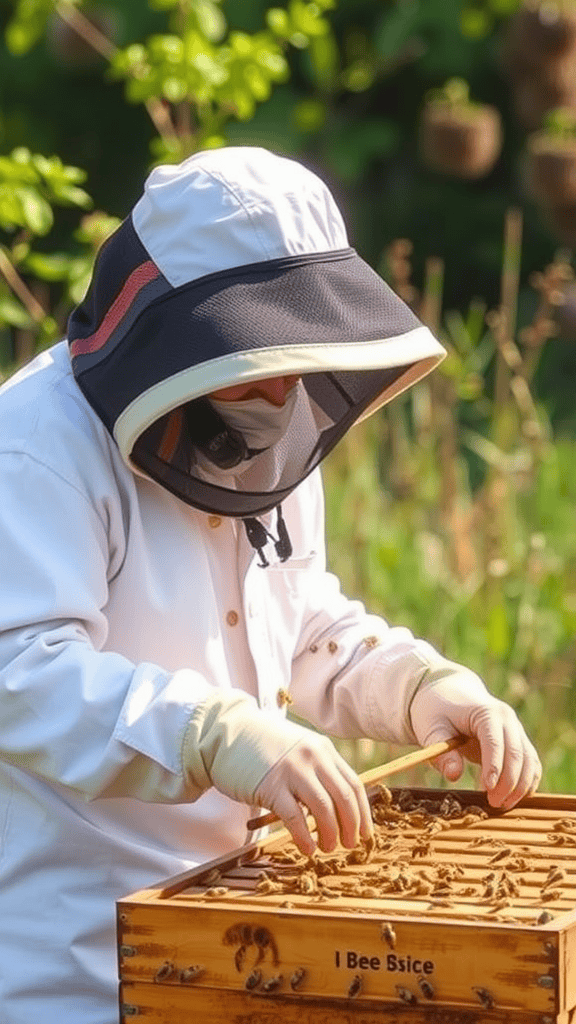Essential Beekeeping Tips for Beginners: A Comprehensive Guide
Beekeeping can be an incredibly rewarding hobby. For beginners, it’s crucial to start with the right tips to ensure a smooth and successful journey into the world of bees. From understanding the basics to managing your hive effectively, here are some essential beekeeping tips that every novice should know.
Understand the Basics of Bees
Before you dive into beekeeping, it’s important to learn about bees themselves. Knowledge about bee species, their roles in the hive, and their behavior will help you manage them better. Here are some core concepts to grasp:
- Worker Bees: These are female bees responsible for foraging, cleaning, and caring for the queen and brood.
- Queen Bee: The sole reproductive female in the hive, she’s crucial for laying eggs. Understanding her life cycle is important.
- Drones: Male bees whose primary role is to mate with the queen.
Choose the Right Beekeeping Equipment
Your beekeeping setup influences your success. Invest in essential equipment, which includes:
- Beehive: Wooden or plastic hives are common; choose one suited for your climate.
- Protective Clothing: A bee suit, gloves, and veil are essential to protect yourself during inspections.
- Tools: A hive tool for prying apart frames, a smoker to calm the bees, and a bee brush to gently move them are key items.
Start with a Healthy Bee Colony
Acquiring a healthy bee colony sets the foundation for successful beekeeping. Here’s how to get started:
- Buy Local Bees: Bees adapted to your local environment are more likely to thrive.
- Join a Beekeeping Club: Connect with local beekeepers who can provide insights and potentially sell you a healthy colony.
- Consider Packages or Nucs: Beginners often start with a package of bees or a nucleus colony (nuc), which is easier to manage.
Regular Hive Inspections
Checking on your hive frequently is important. Regular inspections help you track the health of your bees and catch problems early. Here are some key points:
- Frequency: Inspect your hives every 7 to 10 days during the active season.
- Look for Signs of Disease: Keep an eye out for abnormalities like unusual smells or dead bees.
- Check for Pests: Varroa mites, wax moths, and other pests can harm your colony. Be proactive in managing them.
Be Mindful of Bee Behavior
Understanding bee behavior encourages better interactions with your hive. Here’s what to know:
- Be Calm: Quick movements can agitate bees; approach hives slowly and calmly.
- Timing: Late afternoon or early evening is often best for inspections when bees are less active.
- Weather Conditions: Avoid inspecting hives during cold weather or heavy rain.
Learn About Honey Production
Part of beekeeping is understanding how honey is produced. Here are some basics:
- Nectar Sources: Monitor the availability of flowers in your area for nectar collection.
- Extracting Honey: Learn the methods for harvesting honey, such as using an extractor or crushing combs.
- Storage: Store honey properly to prevent fermentation and spoilage.
Stay Educated and Seek Help
Continuous learning is key in beekeeping. Resources include:
- Books: Seek reputable books that focus on beekeeping techniques and bee biology.
- Online Forums: Join discussions with fellow beekeepers for tips, experiences, and advice.
- Workshops: Attend local workshops or classes to enhance your practical skills.
By following these essential beekeeping tips, you will be better prepared to manage your bees effectively and enjoy the many rewards of this fascinating hobby. Embrace the journey and nurture your understanding to foster a thriving hive!
Common Mistakes New Beekeepers Make and How to Avoid Them
Beekeeping can be a rewarding hobby, but new beekeepers often stumble through their first season due to common pitfalls. Learning about these mistakes can save you time, money, and frustration. Below are frequent missteps and effective strategies to help you navigate your journey in this fascinating field.
Neglecting Basic Research
One of the biggest mistakes beginners make is diving into beekeeping without ample research. It’s crucial to understand bee behavior, hive management, and seasonal changes affecting bees. Take time to read books, join local beekeeping associations, and attend workshops or webinars. Familiarizing yourself with terminology and techniques lays a solid foundation for future success.
Choosing the Wrong Equipment
Investing in the right equipment is essential. New beekeepers often purchase items that aren’t suitable for their specific needs or local climate. Here’s what to consider:
- Hive Type: Choose a hive that suits your skill level and the local environment, whether it’s Langstroth, Top-Bar, or Flow Hive.
- Protective Gear: Invest in a good bee suit, gloves, and a veil. Protection helps ease your nerves and keeps you safe during hive inspections.
- Tools: Essential tools like a smoker, hive tool, and bee brush can make your work more efficient and enjoyable.
Poor Hive Placement
Selecting the right location for your hive is crucial. Many beginners underestimate the importance of sun exposure and wind protection. Here are a few tips:
- Choose a site that receives morning sunlight to help warm the hive and encourage foraging early in the day.
- Ensure the hive is sheltered from strong winds and heavy rain, which can stress the bees.
- Avoid placing the hive near loud noises or strong odors that can disturb the colony.
Over- or Underfeeding Bees
Feeding is an essential part of beekeeping, especially for new colonies. Beekeepers often make errors here:
- Overfeeding: This can lead to increased hive traffic and possible disease. Only feed when necessary, like during nectar dearths in early spring or late fall.
- Underfeeding: This can starve a colony, especially when the bees are still establishing themselves. Regularly check their food stores, and provide sugar syrup if needed.
Ignoring Pest Management
Pests like Varroa mites can devastate bee colonies if left unchecked. New beekeepers sometimes overlook regular inspections for signs of pests and diseases. Here are effective methods to manage these threats:
- Regular Inspections: Check your hives every few weeks during the active season for signs of pests or disease.
- Treatments: Familiarize yourself with treatment options such as organic acids or essential oils that can minimize pest threats without harming the bees.
Inconsistent Hive Inspections
Another frequent mistake is infrequent or rushed hive inspections. Inspections not only help diagnose issues but also boost your confidence as a beekeeper. Here are key points to remember:
- Inspect hives every 7 to 10 days during active seasons.
- Take time to observe the bees’ behavior, look for a healthy queen, and check for signs of queen cells, which indicate swarming.
- Document your observations to track hive health and make informed decisions in the future.
Not Keeping Records
Failure to keep detailed records can lead to confusion and costly mistakes. Documenting your beekeeping activities provides insight into what works and what doesn’t. Consider tracking:
- The date of inspections and what you observed.
- Weather conditions during visits, which can affect bee behavior.
- The input and output of honey production, including feeding and treatment schedules.
As you embark on your beekeeping journey, remember that making mistakes is part of the learning curve. By being aware of these common pitfalls and applying the tips provided here, you’ll be well on your way to establishing a thriving hive and enjoying the incredible world of bees. Happy beekeeping!
Conclusion
As you embark on your beekeeping journey, remember that the path to becoming a successful beekeeper is paved with knowledge, patience, and experience. By following essential tips tailored for beginners, you can create a thriving environment for your bees. Investing time in learning about hive management, bee behavior, and seasonal care strategies will pay off in the long run, allowing you to enjoy the many benefits of beekeeping, from honey production to pollination of your garden.
Being aware of common mistakes that new beekeepers often make is equally crucial. Avoid getting overwhelmed. Start with the basics, such as understanding the importance of regular hive inspections and monitoring for pests. Forgetting these fundamental practices can lead to bigger issues down the road. Embrace the learning curve, and don’t hesitate to seek advice from local beekeeping clubs or experienced beekeepers.
Remember, every beekeeper faces challenges—what matters is how you learn and adapt. Remaining engaged with the beekeeping community will offer support and a wealth of knowledge that can greatly enhance your skills. As you gain experience, you’ll develop your techniques and personal style of beekeeping.
Cherish your bees and the environment you create for them. With time, dedication, and the right approach, you will not only avoid the pitfalls new beekeepers face but also thrive in this rewarding hobby. Celebrate your successes, learn from your mistakes, and enjoy the sweet rewards of your hard work!
As an Amazon Associate, I earn from qualifying purchases.

